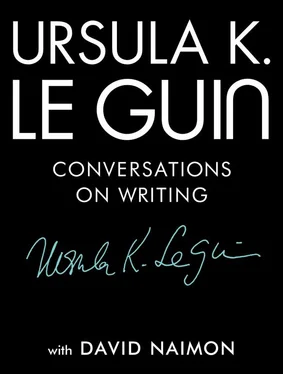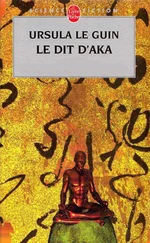DN:When you received the National Book Foundation Medal for Distinguished Contribution to American Letters in 2014, you gave both a beautiful and blistering speech about the commodification of art versus the practice of art. A speech that became an immediate viral sensation.
UKL:That was my fifteen minutes, my whole fifteen minutes. That was so amazing, when I woke up the next morning.
DN:You end Late in the Day with a transcript of this speech. In it you say that resistance and change often begin in art, and that most often it is in the art of words that you see the beginnings of resistance and change.
UKL:After all, dictators are always afraid of poets. This seems kind of weird to a lot of Americans to whom poets are not political beings, but it doesn’t seem a bit weird in South America or in any dictatorship, really.
Over the past decade, it is in-the-world Ursula, as public figure and public thinker that has risen to prominence. During that time, she publicly resigned from the Authors Guild to protest the settlement with Google that allowed them to digitize books in disregard of copyright. She also gave what is widely regarded as the most ferocious speech in National Book Foundation history, using her acceptance of the Medal of Distinguished Contribution to American Letters to lambast the deepening corporatization and commodification of books and their authors by the likes of Amazon. She has become an important part of the national conversation on many issues of the day, from the meaning of facts in the so-called postfactual era, to the meaning of “public lands” at a time when a wildlife refuge in southeastern Oregon was occupied by a militia in order to “liberate” such lands from the government. It is also during this time that Ursula has opened up about her early struggles as a writer, offered advice on writing in a website forum, and given us a different look into her life with the serial publication of her cat Pard’s “memoirs” on her blog.
It seemed fitting, then, for our third conversation, one about writing nonfiction, that we met not at the radio station, but at her home. Erin, the PM news coordinator at KBOO, someone who coincidentally was helping with a documentary being filmed on Ursula’s life and career, volunteered to serve as sound engineer for our conversation. I traveled there with Erin, and we set up in a cozy book-filled space on the upper floor of the house where the sound quality would be at its best for a field recording. Nevertheless, the outside world still intervened. We paused as a truck rumbled by on a nearby street, or to greet Pard, who wanted to check out what all the fuss was about before returning to his favored spot on the bed in a nearby bedroom.
You’ll discover, as I did, that Ursula feels most at home in fiction and poetry, more uneasy in the world of declaration and assertion. In her novel The Left Hand of Darkness , she writes, “To learn which questions are unanswerable, and not to answer them : this skill is most needful in times of stress and darkness.” And yet, in her essay collections, her literary criticism, her speeches—this arena where she delivers her views on things—whether about science and the environment, Google and Amazon, or feminism and the canon, she seems to do so in defense of the voiceless and in the spirit of the unanswerable inside every artist, every person.
At the end of this nonfiction conversation, I mentioned how rare it is to be able to talk with someone with such a deep history in all three genres—fiction, poetry, nonfiction. How unique this journey had been. In fact, I couldn’t imagine who else I could’ve done this with. “Maybe we should make this into a book!” Ursula answered. And here we are, her musing has become our reality, an object out in the world, held open in our hands.
—David Naimon
• • •
DAVID NAIMON:This is our third conversation about your writing, the first two times at the radio station and this time here at your house. Given that we’ve talked about both fiction and poetry, when Small Beer Press announced its release of your collection of nonfiction, it seemed only natural to complete the circle, the circle of genres, to meet again, to talk about the art of the essay, and the art of literary criticism. It’s interesting, however, that when a reader opens Words Are My Matter for the first time, the first thing they will encounter is a poem followed by the first sentence of the foreword, where you say: “I seldom have as much pleasure in reading nonfiction as I do a poem or a story.” Can you elaborate on why that is? And why you open the book with an interrogation of your interest, or lack of interest, in nonfiction?
URSULA K. LE GUIN:I don’t know that I can explain it. This is my fourth or fifth book of nonfiction but, in fact, I don’t think of myself as a nonfiction writer. So I suppose it was a backhanded apology in a way. Here I am doing this again, even though I’m saying, “It’s not my thing, it’s not really my shtick.” But here I am, waving it around.
DN:So, as a reader, what is the nonfiction that you gravitate toward? What in your mind elevates a work of nonfiction to a type of art that is compelling to you?
UKL:It’s what I find I can read. It partly has to do, I think, with old age. I need a narrative, but I’ve always really needed a narrative. I’m just no good at abstract thinking. That means I tend to read biography and autobiography, and sciences such as geology, which tell a story through history, and history itself. And not very much that is abstract or theoretical. I have real trouble with philosophy. I took it as a freshman in college. We all had to. And I liked it but it never would stick. I can’t keep it in my head. It has to be a story. If it is a parable then I remember it.
DN:You said in the foreword to Words Are My Matter something that you alluded to here as well. You said that writing fiction and poetry is natural for you, you desire to do it and are fulfilled by doing it and feel like you can judge its honesty and its quality in a way that you can’t with your nonfiction. That writing nonfiction feels like work, and that, unlike your stories, it will be judged by people who know a lot more than you do about whatever the topic is at hand. Given that unnerving uncertainty how do you ultimately find solid ground and know an essay is finished and stands on sturdy legs?
UKL:Getting started is hard. I throw away endless first pages grinding the gears until I can get the machinery going. As for knowing when it’s done, that’s a real poser sometimes. I wrote a piece for a talk years ago, “The Fisherwoman’s Daughter,” and every time I gave it as a talk the audience would give me so much feedback that I’d have to rewrite the article. Finally I just said, “Enough! I have to stop rewriting it!” and published it as it was. But doing that means you didn’t finish something per se, you just had to stop. And I feel that, for any piece that is a matter of opinion, you really have to try to leave the door open at the end of the piece.
DN:You name one particular essay in the book, entitled “Living in a Work of Art,” as perhaps your favorite piece in the collection. And it is one of the rare pieces that wasn’t commissioned. It was something you wanted to write, on the pure principle of it. You say something very interesting about the process of writing this piece: “When I can use prose as I do in writing stories as a direct means or form of thinking, not as a way of saying something I know or believe, not as a vehicle for a message, but as an exploration, a voyage of discovery resulting in something I didn’t know before I wrote it, then I feel that I am using it properly.” I would love it if you could tell us a little about the process of exploration in putting together “Living in a Work of Art,” because I know, as a reader of it, one of the pleasures was the sense of exploring with you, of discovering things as you were discovering them.
Читать дальше









